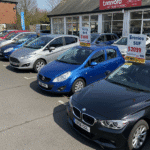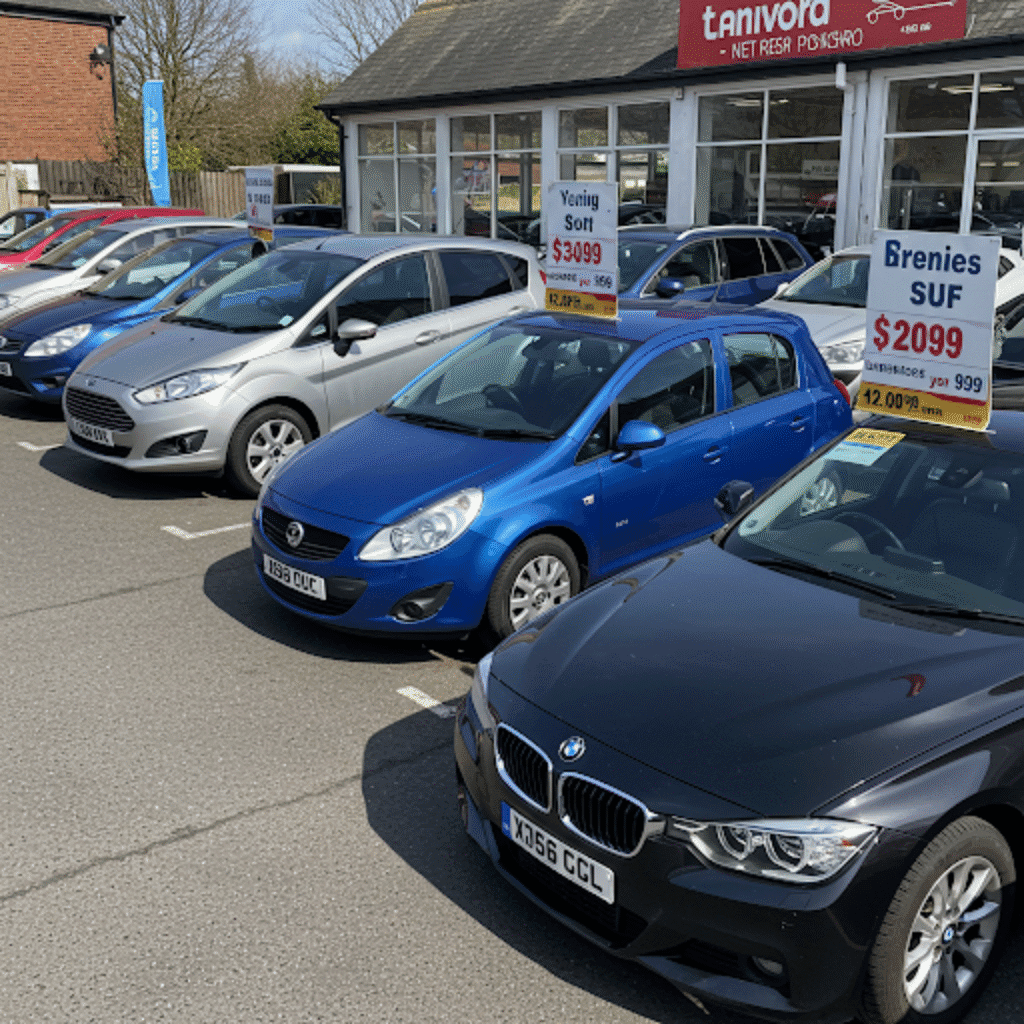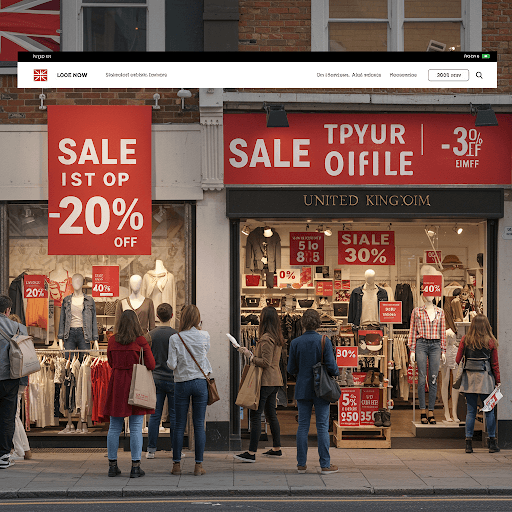
Finding Your Perfect Pre-Owned Car Locally: A UK Buyer’s Guide
Thinking about your next car? For many drivers across the United Kingdom, the allure of a brand-new vehicle is often overshadowed by the smart economics and wider choice offered by the pre-owned market. Searching for “pre owned cars for sale near me” is often the first step on an exciting journey towards finding reliable, affordable transport. But navigating the world of second-hand vehicles can feel daunting. Where do you look? What should you check? How do you ensure you’re getting a good deal and not inheriting someone else’s problems? This guide is designed to steer you through the process, helping you find the right pre-owned car, right on your doorstep.
Why Go Pre-Owned? The Smart Choice for UK Drivers
The advantages of buying a used car extend far beyond just the initial sticker price. Let’s explore why it’s such a popular option:
- Significant Cost Savings: This is the most obvious benefit. New cars depreciate fastest in their first few years. By buying a car that’s even just a year or two old, you can save thousands of pounds compared to the new list price, letting the first owner absorb the steepest drop in value. This means your budget might stretch to a higher specification model or a more prestigious brand than you could afford new.
- Beating Depreciation: Depreciation doesn’t stop after the first year, but it does slow down considerably. Buying pre-owned means your vehicle will likely retain its value better over the course of your ownership compared to buying new.
- Wider Selection: The used car market is vast! You’re not limited to the current model year lineup. You can find discontinued models, specific trim levels, or older classics that might better suit your needs or tastes. Searching locally often uncovers hidden gems you wouldn’t find in a national search focused solely on new stock.

- Potentially Lower Insurance Premiums: Generally, insuring a used car costs less than insuring its brand-new equivalent, as the car’s replacement value is lower. While insurance costs depend on many factors (driver history, location, model), this can contribute to lower overall running costs.
- Nearly-New Benefits: Many pre-owned cars, especially those sold through franchised dealers’ ‘Approved Used’ schemes, are only a couple of years old and may still have a significant portion of their original manufacturer’s warranty remaining. This offers peace of mind similar to buying new, but at a reduced price.
Where to Find Pre-Owned Cars in Your Local Area
Your “near me” search will likely bring up several types of sellers, each with its own pros and cons:
Franchised Dealerships (Main Dealers)
These dealerships represent specific manufacturers (e.g., Ford, BMW, Vauxhall). They often sell ‘Approved Used’ cars from their own brand, which have undergone rigorous checks.
- Pros: High standards of preparation, often come with comprehensive warranties, breakdown cover, potential manufacturer-backed guarantees, good facilities, cars usually well-vetted. Approved Used schemes offer significant peace of mind.
- Cons: Generally the most expensive option for buying used, might have less variety of other brands.
Independent Dealerships
These are non-franchised garages selling a variety of makes and models. Quality and service can vary significantly.
- Pros: Often more competitive pricing than main dealers, wider variety of stock, can build a local relationship for servicing, potentially more room for negotiation.
- Cons: Standards vary greatly – research the dealer’s reputation. Warranties are usually third-party insurance policies, which may have more limitations than manufacturer warranties. Vehicle checks might not be as thorough as Approved Used schemes.
Car Supermarkets
Large sites holding hundreds or even thousands of cars from various manufacturers.
- Pros: Huge selection in one place, often very competitive, no-haggle pricing models, efficient process.
- Cons: Can feel impersonal, may involve high-pressure sales tactics for extras (finance, warranties, paint protection), often located on outskirts requiring travel, test drive routes might be limited. Thorough personal checks are still crucial.
Private Sellers
Buying directly from the previous owner, often found through online classifieds (like Auto Trader, Gumtree, Facebook Marketplace) or local ads.
- Pros: Usually the cheapest way to buy, direct communication with the person who used the car.
- Cons: Highest risk – cars are sold “as seen” with no warranty or legal comeback if faults develop later (unless misrepresented). Requires the buyer to be diligent with checks. Payment needs careful handling. You have fewer consumer rights compared to buying from a dealer.
Online Marketplaces
Platforms like Auto Trader, Motors.co.uk, Gumtree, eBay Motors aggregate listings from dealers and private sellers. They are invaluable tools for searching locally.
- Pros: Conveniently browse thousands of local listings, filter by make, model, price, distance, features. Compare prices easily.
- Cons: You still need to vet the seller (dealer or private) and inspect the car thoroughly in person. Beware of scams or listings that seem too good to be true.
The ‘Near Me’ Advantage: Why Buying Local Matters
Focusing your search locally offers practical benefits:
- Convenience: It’s much easier to arrange viewings and multiple test drives if the car is only a short drive away.
- Logistics: Collecting your new car is simpler when it’s local.
- After-Sales Support: If you buy from a local dealer (franchised or independent), it’s easier to return for servicing, warranty work, or if any issues arise shortly after purchase.
- Local Knowledge & Reputation: Local independent dealers rely on their reputation within the community. You might get personal recommendations or find online reviews specific to your area.
- Supporting Local Business: Buying from local dealerships helps support jobs and businesses in your community.
Your Essential Pre-Purchase Checklist: Don’t Skip These Steps!
Found a promising car nearby? Brilliant! Now comes the crucial inspection phase. Being thorough here can save you a fortune and a lot of hassle down the line.
1. Do Your Homework First
- Define Your Needs: Be realistic about what you need. How many seats? How much boot space? Primarily city driving or motorway miles (influences petrol vs. diesel vs. hybrid/electric)? What features are essential?
- Set a Budget: Include not just the purchase price, but also insurance (get quotes!), road tax (check rates based on emissions/age), fuel, and potential maintenance/repairs.
- Research Models: Once you have a shortlist, research common problems, reliability ratings, and typical running costs for those specific models and years. Owner forums and motoring websites are great resources.
2. Vehicle History Check (HPI Check)
This is non-negotiable, especially when buying privately but also wise when buying from dealers. For a small fee, companies like HPI Check, RAC Car Passport, or AA Car Check can reveal:
- Outstanding Finance: Is the car still technically owned by a finance company?
- Insurance Write-Offs: Has it been declared Category S (structural damage) or N (non-structural damage)?
- Stolen Status: Is the vehicle recorded as stolen?
- Mileage Discrepancies: Does the recorded mileage history look suspicious compared to the odometer reading?
- Number Plate Changes: Has it had previous registration plates?
- Previous Keepers: How many owners has it had?
A clean history report provides vital peace of mind.
3. The Walkaround: Exterior Inspection
- Bodywork: Look down the sides in good light for ripples indicating accident repairs. Check panel gaps – are they consistent? Look for mismatched paint colours. Check for rust, especially around wheel arches, sills, and bottoms of doors.
- Tyres: Check tread depth (minimum legal limit is 1.6mm, but ideally much more). Are they all the same brand and size? Uneven wear could indicate tracking issues. Check the spare wheel/inflator kit.
- Lights & Glass: Check all lights (headlights, indicators, brake lights, fog lights) work correctly. Inspect glass for chips or cracks (especially the windscreen, as this can be an MOT fail or costly repair).
4. Step Inside: Interior Checks
- Wear and Tear: Does the condition match the claimed mileage? Check the steering wheel, gear knob, pedal rubbers, and driver’s seat bolster for excessive wear.
- Electrics: Test everything! Windows, mirrors, central locking, wipers, washers, horn, interior lights, infotainment system (radio, sat-nav, Bluetooth), heating, and especially air conditioning (does it blow cold?).
- Smells: Sniff for damp (check carpets and boot floor), cigarette smoke, or strong air fresheners potentially masking underlying odours.
- Upholstery & Trim: Check for rips, tears, stains, or damage to seats and trim panels.
5. Under the Bonnet (Even if You’re Not Mechanical)
- Fluid Levels: Check oil (colour and level on dipstick), coolant (level and colour in expansion tank – should be bright, not rusty), brake fluid, and power steering fluid (if applicable).
- Leaks: Look underneath the car and around the engine bay for any obvious oil or fluid leaks.
- Belts & Hoses: Check visible belts for cracking or fraying, and hoses for splits or bulges.
- Battery: Check terminals for corrosion.
- Engine Bay Condition: Does it look reasonably clean, or excessively dirty/neglected? Has it been pressure washed recently (could hide leaks)?
6. Paperwork Power: Documentation Check
- V5C Logbook: Essential. Check the seller’s details match the V5C. Verify the VIN (Vehicle Identification Number) on the document matches the VIN on the car (usually on the dashboard/door pillar). Check the registration number and colour match.
- MOT Certificate: Check the expiry date. Crucially, use the registration number to check the car’s MOT history online via the GOV.UK website. This free service shows past results, failures, and advisories (often highlighting potential future issues) and recorded mileages.
- Service History: Look for a stamped service book and ideally a folder of invoices/receipts for work done. Consistent main dealer or reputable specialist servicing is a good sign. Check if major work like cam belt changes (if applicable) has been done at recommended intervals.
7. The All-Important Test Drive
Never buy without driving the car first. Aim for at least 15-20 minutes on varied roads (town, faster roads if possible).
- Starting Up: Does it start easily from cold? Any warning lights staying on? Listen for rattles or strange noises from the engine.
- Driving: Listen for unusual noises from the engine (tapping, knocking), exhaust (blowing), suspension (clunks over bumps), or gearbox/clutch.
- Brakes: Do they feel sharp and effective? Does the car pull to one side when braking? Any grinding noises?
- Steering: Does it feel precise? Any vagueness or pulling to one side? Any noises when turning the wheel?
- Clutch & Gearbox: (Manual) Does the clutch bite point feel right? Is the gear change smooth? Any crunching? (Automatic) Are gear changes smooth and timely?
- Performance: Does the engine pull smoothly and strongly as expected for the model?
- Features: Test cruise control, parking sensors, etc., while driving.
If you’re not confident, consider paying for an independent mechanic’s inspection for an expert opinion before committing.
Understanding Approved Used Schemes
Offered primarily by franchised dealers, Approved Used schemes provide an extra layer of reassurance. Cars typically undergo comprehensive multi-point inspections, come with a minimum 12-month warranty, breakdown assistance, and sometimes even a vehicle exchange policy. While they usually cost more than non-approved used cars, the peace of mind, especially on newer or premium models, can be well worth the investment for risk-averse buyers.
Negotiating the Price: Getting the Best Deal
Unless it’s a fixed-price car supermarket, there’s usually some room for negotiation.
- Research: Know the typical market value for the car’s age, mileage, and condition. Use online valuation tools and check prices of similar cars locally.
- Leverage Findings: Use any necessary repairs or minor faults found during your inspection (e.g., tyres needing replacement soon, minor cosmetic issues) as bargaining points.
- Be Polite and Realistic: State your offer clearly and justify it if necessary. Don’t make ridiculously low offers.
- Be Prepared to Walk Away: If the seller won’t meet your realistic price, be prepared to thank them and leave. Sometimes this prompts a better offer.
- Timing Can Help: Dealers often have sales targets, so negotiating towards the end of the month or quarter might yield better results.
Sealing the Deal: Final Steps
Congratulations, you’ve found your car and agreed on a price!
- Payment: Bank transfer is the most secure method for large sums. Avoid carrying large amounts of cash. Get a receipt clearly stating the car details, price paid, date, and seller/buyer information.
- V5C Logbook: The seller keeps the main V5C and notifies the DVLA. You MUST receive the green ‘new keeper’ slip (V5C/2) – you need this to tax the vehicle.
- Insurance: You MUST arrange insurance cover *before* you drive the car away. It’s illegal to drive without it. You can often arrange this online or over the phone using the vehicle registration number.
- Road Tax (VED): You MUST tax the vehicle before driving it on public roads. You can do this online using the 12-digit reference number from the V5C/2 new keeper slip. Any remaining tax from the previous owner is cancelled upon sale – it doesn’t transfer.
Conclusion: Your Local Pre-Owned Journey
Searching for “pre owned cars for sale near me” opens up a fantastic opportunity to find great value and the perfect vehicle for your needs right in your local area. By combining the convenience of local searching with diligent research, thorough checks, and smart negotiation, you can confidently navigate the used car market. Take your time, trust your instincts, perform all the necessary checks (especially history and physical inspection), and don’t be afraid to ask questions. Your ideal, affordable, and reliable pre-owned car could be just around the corner.







